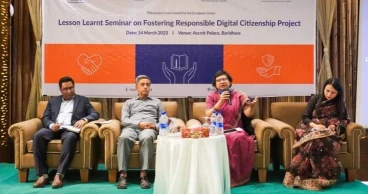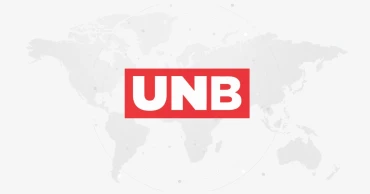digital media
Responsible use of digital media can bring positive change in society: Speakers
Experts and stakeholders discussed different possibilities and obstacles in using digital media in Bangladesh and suggested bringing positive changes in society with the responsible use of online media at a seminar on digital citizenship and freedom of expression at a hotel in the capital Tuesday.
Social enterprise Dnet organised the programme titled "Lesson Learnt Seminar on Fostering Responsible Digital Citizenship" was organised with the support of the European Union (EU) and Friedrich Naumann Foundation for Freedom.
The success and learning aspects of the various capacity-building, awareness and advisory initiatives taken under the "Foster Responsible Digital Citizenship to Promote Freedom of Expression in Bangladesh" project and steps that need to be taken in the future were discussed.
University students, teachers, law enforcement officials, domestic and foreign development sector officials, lawyers, government officials and media workers were present.
UNB Editor Farid Hossain, Bangladesh Parliament Secretariat Additional Secretary Mahbooba Panna, and Sadik Hasan, associate professor of public administration at Dhaka University, were the panellists.
"Our sense of etiquette comes from the kind of etiquette we practice in real life and we get this education from our family. Nowadays due to changes in family structure, proper etiquette is not being developed and the effect is visible on online media," said Farid Hossain.
Read more: Mass awareness needed to ensure safe use of digital platforms: Speakers
Mahbooba said: "Just as it was made compulsory for everyone to have a Covid certificate after the arrival of Covid, can we not introduce digital citizenship certificates for everyone in this digital age?"
Sadik said: "Digital citizenship should be taken to the school level. But before that, it should be decided what will be taken to them, who will take it, how it will be taken."
M Shahadat Hossain, co-founder and executive director of Dnet, said: "Through the Foster Responsible Digital Citizenship project, many young people have been able to learn about exercising their rights safely in the digital world. Our goal is to ensure that youth express themselves within the confines of the law."
Fani Farmaki from EU Delegation to Bangladesh and Naira Nizam from Friedrich Naumann Foundation also spoke at the event.
The issues discussed at the seminar are also available at https://www.digitalcitizenbd.com where a few courses on digital citizenship are also being offered for free.
2 years ago
Draft regulations on digital media going to suppress people’s voice: BNP
BNP on Saturday alleged that the government has formulated two ‘repressive policies’ on digital and social media and OTT platforms to hush up the information about its corruption and misrule and suppress people’s voice.
The party also voiced deep worries that if the two policies are enforced, the freedom of expression of the country’s people and the online-based local and international media, journalists, and their privacy will be hampered and the human rights will be ignored.
Speaking at a press conference at BNP Chairperson’s Gulshan office, BNP Secretary General Mirza Fakhrul Islam Alamgir urged the government to stay away from adopting the policies and to repeal the Digital Security ACT for keeping intact the people’s freedom of expression and the freedom of the press and social and digital media.
Also read: Need greater unity to oust AL govt: Fakhrul
“There's no freedom of speech now after regulating the freedom of press and people’s right to express through amending the ICT ACT and adding section 57 in 2013 and enacting the Digital Security Act in 2018. Two ministries have now taken initiatives to completely curb the leftover freedom expression through two policies,” he said.
The two new policies are The Bangladesh Telecommunication Regulatory Commission Regulation for Digital, Social Media, and OTT Platforms, 2021 drafted by the Information and Communication Technology Ministry and Over the Top (OTT) Content-Based Service Delivery and Management and Advertising Policy 2021 by the Ministry of Information and Broadcasting.
“We can simply say these suppressive policies have been formulated to prevent campaign against the Awami League government’s corruption, mismanagement, vote robbery, human rights violations, enforced disappearances and extrajudicial killings,” Fakhrul said.
He said the government will also use the policies to suppress people’s voices against the distortion of history of the Liberation War. “These two policies have also been made to fortify the Digital Security Act and reinforce the regulation.”
Replying to a question, the BNP leader said their party will come up with action programmes if the government implements the two policies.
"These two principles are not only contradictory to the right to freedom of speech and expression enshrined in Article 39 of the Constitution of Bangladesh, but also contrary to the UN’s the Universal Declaration of Human Rights (UDHR) and International Covenant on Civil and Political Rights (ICCPR)," the BNP leader said.
Besides, he said, in the light Manila Principles on Intermediary Liability and the Santa Clara Principles on Transparency and Accountability in Content Moderation, the two principles are a clear violation of human rights.
Also read: Niko graft case: Charge framing hearing deferred to April 12
"The political purpose of formulating these policies is to perpetuate power in a one-party Baksal style by silencing people through establishing lies by hiding the truth,” Fakhrul observed.
He also said if the policies are enforced, it will put journalists, opposition politicians, human rights activists, and religiously and culturally vulnerable groups at greater risk. “It’ll also have a detrimental effect on human rights."
3 years ago
Bangladesh-origin Imran Khan becomes Chairman of Aleph Holding
Aleph Holding, global partner to the world’s biggest digital media players, on Thursday announced that renowned technology investor and entrepreneur Imran Khan is joining the business as Chairman of the Board.
He will work closely with Gaston Taratuta, Founder and CEO of Aleph Holding, as the organisation eyes significant new growth targets.
Imran Khan, born and raised in Bangladesh was a prominent debater during his early days.
He, later on, moved to the United States as a student and graduated from the University of Denver's Daniels College of Business in 2000.
Read Shammi Quddus: A Talented Bangladeshi Woman in Google, Global Fintech Industry
He is responsible for leading two of the largest tech IPOs in history - Alibaba and Snap – and is known for joining businesses that are primed for accelerated growth.
Aleph is on track to hit $1bn in revenue this year.
Imran Khan will help the company scale beyond this milestone by accessing new markets, acquiring additional partners, and continuing to diversify its service and technology offering.
"I first met Gaston Taratuta five years ago, when his firm won a major contract with Snap,” states Imran Khan, Chairman of Aleph Holding.
Read Dhaka, Seoul take stock of bilateral relations; 3 sectors identified for more focused cooperation
“Since then I have kept an eye on the company, because Aleph’s business model is unique. The organisation has a global infrastructure that is underpinned by genuine local expertise, and combines this with innovative technology in a way no other business in this space can. I’ve been impressed by the breath of the platforms they represent as well as the positive impact they have for advertisers in every market they enter. This is a model with a profound opportunity to scale," he said.
“Imran brings a huge amount of expertise to our business, and his combination of entrepreneurial thinking and global technology experience are the perfect fit for the next stage in our journey,” states Gaston Taratuta, CEO of Aleph Holding.
Read: Team Europe Initiative on Decent Work launched
“I founded the business in 2005 with just $5,000, and today we’re looking to close a year at $1bn in revenue. We see significant new commercial opportunities in Aleph, and Imran will play a key role in helping us achieve them.”
Aleph connects the biggest players in digital media (including Facebook, Twitter, LinkedIn, Snapchat, Twitch and TikTok) with the advertisers that rely on them, whether they’re global brands or aspiring entrepreneurs.
The company ensures that the opportunities offered by digital media are available in every corner of the globe - and does this in over 70 markets worldwide.
Read 8 Mistakes to Avoid in a New Ecommerce Startup in Bangladesh in 2021
4 years ago

.jpg)


